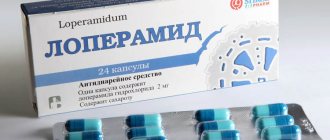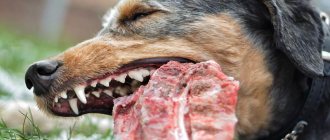Keeping your pet healthy is the primary goal of any owner. It happens that due to an incorrectly selected diet, dogs’ digestive system is disrupted, which can lead to serious illnesses.
To prevent the consequences, the well-known drug “Pancreatin” comes to the rescue.
Let us remind you that the main active ingredient of “Pancreatin” is a powder made from pancreatic enzymes taken from livestock. Necessary for the breakdown of fats, carbohydrates, proteins in the small intestine.
When overeating
Overeating is not a serious danger for dogs, just like it is for people. The main signs of overeating are always noticeable: a slightly enlarged belly, heavy breathing, whining and attempts to lie down more comfortably.
In this case, it would not be superfluous to give the dog “Pancreatin”, but only observing a certain dosage. The approximate dose of "Pancreatin" for medium-sized dogs: one or two tablets of 250 mg, for large dogs - three to four tablets.
As a rule, symptoms of overeating disappear after a few hours, and the pet’s digestion returns to normal.
The occurrence of the disease in puppies
Predisposition to the disease in puppies can be transmitted along the hereditary line, from adult parents who have had hepatitis. Acquired pancreatitis in puppies (over 6 months old) is possible after an infectious or viral disease that has affected the functioning of internal organs.
The acute form of pancreatitis can be caused by unsystematic and uncontrolled feeding of the puppy - if they become overly fat, they are vulnerable to the disease. You should not give food prepared for adult dogs; it is difficult for their digestive system to digest and is poor in essential vitamins.
At the first symptoms of poor health in puppies (vomiting, severe diarrhea, fever), you should contact a veterinary hospital. Examinations by specialists, tests (blood, urine, feces), ultrasound will allow you to make the correct diagnosis, provide first aid with painkillers, antidiarrheal drugs, and prescribe the necessary therapeutic treatment.
The puppy’s fragile body can hardly tolerate the acute form of pancreatitis; the likelihood of it becoming chronic is very high. Therefore, it is so important to follow all the recommendations of the rehabilitation period: follow dietary feeding, using special food and products for puppies, do all the necessary vaccinations, give vitamins and minerals necessary for growth.
For diarrhea
Diarrhea in itself is not dangerous for a dog, nor is overeating.
In most cases, it occurs due to poor-quality foods eaten. Important! It happens that diarrhea is accompanied by a number of unpleasant symptoms: the presence of black or scarlet blood, severe vomiting.
In this case, it is necessary to urgently consult a doctor, since the symptoms mentioned above may indicate intestinal bleeding. If your four-legged friend “just has diarrhea” and nothing bothers him, it is not forbidden to give “Pancreatin” along with food for a speedy recovery of the pet. For a large dog we give a whole tablet of Pancreatin 8000. If a course of treatment is prescribed, then it must be taken for five days - twice a day, then another five days - once a day.
Content:
- Best Digestive Enzymes for Dogs
- Benefits of Digestive Enzymes for Dogs
- Why Dogs Need Digestive Enzymes
- What to Look for in Digestive Enzymes for Dogs
- How to Give Your Dog Digestive Enzymes
- Precautionary measures
- Read more: Turmeric for Dogs: Top 5 Benefits of Turmeric for Dogs
Once you know how beneficial digestive enzymes can be for human health, you won't be surprised that they can work wonders for your furry friends too. Just like for humans, dog digestive enzymes act as catalysts and speed up specific, life-sustaining chemical reactions in the body. They also play a crucial role in nutrient absorption.
If your dog eats food in the wild like its ancestors, its diet will be rich in beneficial enzymes. But today, most commercial dry or canned dog foods lack enzymes. It's even possible that your dog is struggling with gastrointestinal problems as a result of a diet that lacks enzymes.
If you are wondering what can I feed my dog with gastrointestinal problems? You can talk to your veterinarian about food allergy testing, changing your dog's diet, and trying digestive enzymes for dogs or digestive enzymes and probiotics for dogs.
Dogs known to benefit from enzymes include those who are older (and therefore have fewer enzymes in their bodies), have food allergies/intolerances, or those who struggle with digestive issues.
When vomiting
Vomiting in dogs can be of two types: physiological or pathological. If vomiting is caused by overeating or eating food that irritates the taste buds, then there is no need to worry, this is a clear example of a physiological phenomenon.
If vomiting is not accompanied by other signs, then the maximum that can be done to help your pet is to give activated charcoal. If, in addition to vomiting, there is diarrhea, loss of appetite, weakness, or unusual color of vomit (yellow or red), this may indicate that the dog has poisoning, gastrointestinal diseases, allergies, or worms.
In this case, you should under no circumstances self-medicate, let alone give your dog Pancreatin. All enzymes included in this drug are released only in the small intestine of mammals, where they exert their therapeutic effect. So “Pancreatin” simply may not help.
Why Dogs Need Digestive Enzymes
You may be wondering, how do I know if my dog needs digestive enzymes? To help you understand this, let's look at some dogs that are good candidates for enzyme supplementation.
If your dog falls into one or more of the following categories, he may benefit from taking digestive enzymes:
- A dog with exocrine pancreatic insufficiency (EPI) and/or pancreatitis (the second most common cause of EPI in dogs is chronic inflammation of the pancreas, which is known as pancreatitis)
- Older dog (older dogs produce fewer enzymes)
- Dog with indigestion
- A dog with a food allergy or food intolerance
How to tell if your dog has digestive problems? If your dog frequently experiences gas, diarrhea, soft stools, and/or stools that contain a lot of mucus, he may need digestive enzymes.
You may also find that digestive enzymes are helpful if your furry friend tends to eat other animals' poop or his own. This habit may be caused by the dog looking for extra nutrients, so by taking digestive enzymes, your dog will be less likely to eat his own or another animal's stool.
In some dogs, exocrine pancreatic insufficiency (EPI) means the pancreas cannot produce enzymes. According to PetMD:
Dogs with EPI typically require digestive enzyme supplements to support survival. Digestive enzymes for dogs with pancreatitis are also much stronger.
If your stomach is growling
“Pancreatin” does not treat rumbling in the stomach, in fact, like any other drug. Rumbling is a natural occurrence when dogs are hungry or digesting food. If the rumbling is not accompanied by other suspicious signs, you can relax and not attempt to save your pet.
But there are cases when flatulence is accompanied, again, by diarrhea, vomiting, apathy or lack of appetite. It is necessary to consult a doctor, and only he will be able to correctly select a course of treatment.
Chronic pancreatitis in dogs: symptoms
Many diseases of domestic animals arise as a result of improper feeding regime and diet. Hard-to-digest porridges made with fatty bone broths, tasty morsels from the master's table, low-quality ready-made food, and an uncontrolled amount of food with little physical activity contribute to the development of obesity in dogs. As a result, the functioning of the organs that ensure normal digestion is disrupted, which leads to serious illnesses in pets.
There are seven different glands in a dog’s body, the pancreas is one of the main ones, functionally necessary to provide the animal with vital energy. The enzymes it produces help digest food. In the endocrine system, it synthesizes insulin, a hormone that controls blood glucose levels for proper metabolism in cells and tissues.
Pancreatitis (Latin—Greek pancreatitis) is an inflammation of glandular tissues that affects the production of pancreatic juice. The inflammatory process causes a narrowing of the gland ducts for the passage of enzymes that break down food into the duodenum; insufficient quantities of them negatively affect the gastrointestinal tract system.
In this case, stagnation of enzymes (enzymes that accelerate metabolism) occurs in the gland itself, their accumulation and activation leads to self-destruction of its tissues, provokes the release of the resulting toxins into the bloodstream, and harms other internal organs.
According to the rate of accumulation of symptoms of inflammation and the duration of its course, pancreatitis is divided into acute and chronic
Acute pancreatitis occurs suddenly; the inflammatory process in dogs can be caused by poor-quality food, overeating fatty foods, intoxication of the body caused by exposure to chemicals and drugs, or toxic substances entering the stomach.
The initial signs of pancreatitis in dogs are similar to common intestinal disorders or poisoning, then as they accumulate, a sharp deterioration occurs.
- Experiencing pain, the dog rushes around restlessly, squealing.
- Shows no interest in food, but greedily laps up water.
- Frequent vomiting before and after feeding.
- The mucous membrane of the mouth dries out, and dehydration occurs.
- Feverish condition.
- Severe skin itching occurs.
It occurs as a complication from previous infectious diseases typical of dogs, chronic diseases of internal organs, or infections with round or flatworms that parasitize the intestines and liver.
Chronic pancreatitis in dogs is also caused by congenital changes in the structure of the gland tissue, traumatic damage to it, and frequent exacerbations of the acute form of pancreatitis.
Chronic pancreatitis goes away for a long time without warning signs of the disease; over time, characteristic symptoms of prolonged inflammation appear.
- The dog becomes lethargic, lies down most of the time, and is reluctant to go for a walk.
- He eats little, sometimes does not touch food, and regurgitates food.
- Urinary disorders, urinary incontinence.
- A sharp decrease in weight is noticeable, the coat is dull, trembling appears in the limbs.
- The consistency of stool changes.
- The abdominal tone is tense, the stomach is swollen with gas.
A veterinarian makes an accurate diagnosis. During the clinical examination, the symptoms and treatment of pancreatitis in dogs are examined, the periumbilical region of the abdominal cavity is palpated, the necessary tests are taken (blood, urine, feces), an ultrasound and an x-ray are taken. Sometimes additional gastroscopy and biopsy are required.
Further treatment of pancreatitis at home is carried out based on the results of a complete examination. The identified causes of the disease show how to treat the pancreas in a dog.
In case of acute pancreatitis or exacerbation of the chronic form, subcutaneous injections are prescribed with drugs that eliminate the pain effect (Butorphanol, other analgesics); relieving spasms of the gland ducts (solution of No-shpa, Eufillin); They give tablets (Cerucal, Ondansetron) that stop vomiting. A dehydrated animal is given drips with sodium chloride (saline) to replenish the water-salt balance. All medications are taken in dosages prescribed by the veterinarian, strictly according to the instructions.
Treatment of pancreatic inflammation, diagnosed as a complication, should begin with therapeutic treatment of a possible infection, diseases of the internal organs, supplementing the listed drugs with injections of antibiotics.
Can a dog die from pancreatitis? When the disease is started at a certain stage of treatment, it causes pancreatic necrosis in dogs; the pathological process occurs in stages: consistent deformation of the pancreatic tissue and their slow death. Energy and chemical metabolic processes in the dog’s body are disrupted, which leads to death.
Instructions for use
Dosage
A single dosage of medication per kilogram of dog weight is 20-50 mg. The veterinarian must select the dosage and duration of use of this digestion-improving drug for each animal individually.
How to give tablets?
The tablets can be given to animals before, during and immediately after meals in tablet or powder form (crush the tablet yourself).
For puppies
Puppies, unlike adult four-legged friends, are most susceptible to diseases, including diseases of the gastrointestinal tract. Therefore, the selection of a baby’s diet must be treated with extreme caution and seriousness.
But if the puppy still suffers from diarrhea or vomiting, it is not forbidden to give him Pancreatin, but be sure to first calculate the exact dosage. However, doctors still recommend giving preference to more gentle and harmless drugs when treating puppies. For example, activated carbon.
Pregnant and lactating
Pregnant and lactating dogs should also be treated with care. Therefore, for symptoms such as diarrhea or vomiting, veterinarians recommend giving expectant mothers Enterofuril or Enterosgel.
These medications can be given to pregnant or lactating pets and newborn puppies, as these medications have no contraindications.
Best Digestive Enzymes for Dogs
What helps a dog's digestive system? Many things can, and digestive enzymes are high on that list. What are Digestive Enzymes for Dogs? Enzymes can be found in food as well as the digestive organs of dogs. Digestive enzymes for dogs are also available in supplement form.
There are four main types of natural digestive enzymes for dogs:
- Protease – An enzyme responsible for breaking down proteins into shorter fragments called peptides and ultimately into their components, amino acids.
- Amylase – Digestive enzyme that breaks down starch in food into smaller carbohydrate molecules
- Lipase – An enzyme produced primarily by the pancreas that helps the body break down and digest dietary fats.
- Cellulase – An enzyme that does not exist in the dog's digestive system, but is needed to break down fiber, such as from grains and plant material.
Medicines for animals > Pancreatin (tablets)
Brief description:
this drug compensates for the deficiency of enzymes involved in the digestive process. It contains lipase, alpha-amylase and proteases (chymotrypsin and trypsin). The function of lipase is to break down fats and fatty acids, the function of amylase is to break down starch, and the function of proteases is to break down proteins. In addition, Pancreatin has a stimulating effect on the activity of the pancreas and has a moderate analgesic effect. The tablets of this product have a special protective coating that protects them from the destructive effects of gastric juice. Thus, all the enzymes that make up this drug are released only in the small intestine of mammals, where they exert their therapeutic effect. These enzymes are not absorbed into the bloodstream of animals - they are hydrolyzed and digested directly in the intestines.
Veterinarians prescribe Pancreatin to animals suffering from chronic pancreatitis, enterocolitis, gastritis, flatulence, diarrhea of non-infectious origin, and obstruction of the pancreatic ducts. It is indicated for mammals with pathology of the biliary tract. This medicine is prescribed for the correction of various forms of disturbances in the digestion and absorption of food, including errors in nutrition (consumption of indigestible, unusual or fatty foods).
For whom:
for mammals.
Leave form:
The medicine is available in the form of enteric-coated tablets. Each tablet contains 250 mg of pancreatin.
Dosage:
tablets must be given to animals before, during and immediately after meals 3-4 times a day. A single dosage of the drug per 1 kg of animal weight for cows and horses is 2-5 mg, for goats, pigs and sheep - 5-10 mg, for rabbits, dogs - 20-50 mg, for fur-bearing animals - 10-20 mg . The veterinarian must select the dosage and duration of use of this digestion-improving drug for each animal individually.
Restrictions:
a contraindication to the use of this medicine is the animal’s hypersensitivity to porcine pancreatin, acute or chronic pancreatitis in the acute stage. It should not be used if the animal has intestinal obstruction. Sometimes taking this drug is accompanied by the appearance of side effects in animals such as diarrhea or constipation, nausea, discomfort in the epigastric region, and allergic reactions. Taking this enzyme preparation reduces the absorption of folic acid and iron.
Leave form:
The medicine is available in the form of enteric-coated tablets. Each tablet contains 250 mg of pancreatin.
Restrictions
Pancreatin should not be used in acute forms of the disease or relapse of chronic pancreatitis. Other limitations include hypersensitivity to porcine pancreatin and intestinal obstruction.
In some dogs, taking the drug can cause negative consequences - digestive disorders (diarrhea, constipation), nausea, allergic reactions.
Important!
It should be taken into account that taking Pancreatin impairs the absorption of iron and folic acid.
pancreatin for dogs dosage
Interesting fact: The human brain is as active during sleep as it is during wakefulness. At night, the brain processes and integrates the experiences of the day, decides what to remember and what to forget.
Interesting fact: According to Californian scientists, people who eat at least 5 walnuts a week live 7 years longer on average.
Interesting fact: The human eye is so sensitive that if the Earth were flat, a person could notice a candle flickering in the night at a distance of 30 km.
Interesting fact: There are approximately one hundred trillion cells in the human body, but only a tenth of them are human cells, the rest are microbes.
Interesting fact: The highest body temperature was recorded in 1980 for Willie Jones from Atlanta, USA; upon admission to the hospital it was 46.5C.
Interesting fact: Diabetes ceased to be a deadly disease only in 1922, when insulin was discovered by two Canadian scientists.
Interesting fact: The Egyptian pharaohs used leeches; in ancient Egypt, researchers found images of leeches carved on stones, as well as scenes of their treatment.
You can’t do without plant foods
In addition to proteins, plant foods contain many substances necessary for dogs. It is important to know how to properly prepare these foods to make them easier for your dog to digest.
Carbohydrates. Some (starch, cellulose) are not broken down and are not absorbed by the dog’s body, while others, for example, glucose and fructose, are easily absorbed and quickly enter the blood and muscles. Carbohydrates are processed in the liver and stored here as an “emergency reserve” (glycogen). With an excess intake of carbohydrates, the liver is overloaded and performs its blood purification function worse. This can lead to allergic and diathesis reactions. This is why it is so important to maintain a balance of plant and animal products in food. The main source of carbohydrates is various cereals, the best of which are buckwheat and long-grain rice. The cereal should be well cooked, but crumbly (as for a side dish).
Vitamins and other biologically active substances that plants are rich in cannot always enter the dog’s body. Plant foods must be properly prepared: raw vegetables, fruits and herbs are crushed to a puree immediately before adding them to the food. Whole vegetables and fruits are not food, but a toy or a toothpick, but, at the same time, garbage for the stomach and intestines. Boiled vegetables and fruits are almost useless.










